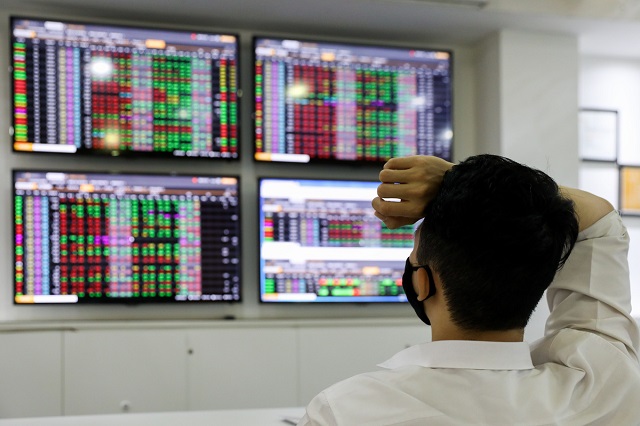Overheated stock market poses risks for Vietnam long-term growth: Experts
It remains unclear whether the rise of the stock market benefits enterprises and supports growth.
At a time when the Covid-19 pandemic continues causing multiple setbacks in the economy, the rapid rise of the local stock market is raising questions over its sustainability and impacts on long-term economic growth.
| Investor at a securities company in Hanoi. Photo: Viet Linh |
“For the past six months, the benchmark Vn-Index had outperformed its regional peers with an expansion rate of 28%, higher than the global average which is around 10-14%. This, however, stems from the fact the country’s economic growth forecast remains lower than others, including China or India,” economist Can Van Luc gave his assessment in a recent economic conference.
Despite the Covid-19 pandemic, State budget revenue during the January-June period stayed positive, reaching 58% of the yearly estimate, which Luc said is mainly thanks to securities and real estate transactions. “This proves to be unsustainable in the long run,” he added.
In the first half of this year, the amount of corporate income tax from properties transfer rose by 61.7% year-on-year to VND8.6 trillion (US$347.3 million), while revenue was generated from transactions in the stock market increased by 2.47-fold to VND2.6 trillion ($113.2 million).
On the issue, Professor Nguyen Khac Quoc Bao from the University of Economics Ho Chi Minh City added the current overheated stock market comes from speculation and price manipulation.
“What concerns me is that there were no clear reasons behind the market’s ups and downs. Many linked the pandemic situation to recent performance, but the fact showed Vn-Index went up last year despite the pandemic,” he added.
Last year, a huge amount of money was injected into the economy, but a battered economy could not fully absorb, so they would flow into securities and real estate, Bao continued.
Bao noted in previous years, an economic expansion rate of 6% came with a credit growth of 12%, which means “a 1% GDP growth was aided by 2% growth in credit”. But last year, the credit growth expanded by 12% while GDP grew nearly 3%.
“It remains unclear whether the rise of the stock market is benefiting enterprises and support growth,” Bao said.
Banking expert Nguyen Tri Hieu explained to The Hanoi Times that the recent uptrend of the stock market was not based on economic fundamentals. “Limited investment options and low-interest-rate environment turn the stock market into an attractive channel for a quick profit,” he added.
As the Vn-Index ended yesterday’s trading session at 1,270, representing a slump of over 149 points since its new height of 1,420.27 in early July, Hieu said the market instability is causing risks for investors and the economy as a whole.
“Price bubbles in markets such as gold, securities, and real estate would eventually burst when the demand side is unable to keep up with the supply,” he added.













